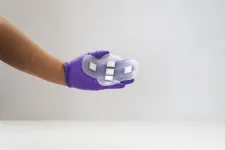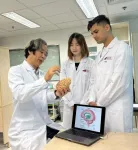(Press-News.org) Mayo Clinic Comprehensive Cancer Center and Columbia University received a five-year, $10.6 million U54 center grant from the National Cancer Institute (NCI) to further study combining the molecular analysis of glioblastoma with MRI.
Glioblastoma is a fast-growing and aggressive brain tumor that begins as a growth of cells in the brain or spinal cord. As it grows, it can invade and destroy healthy tissue. There is no cure, but treatments may slow the cancer's growth and reduce symptoms.
Glioblastoma is a diverse cancer, which means that biopsies from different regions of each patient's tumor can represent widely different tumor biology. Treatments that work for one region of the tumor may not work for others.
MRI provides a way to look at the whole tumor but is poor at differentiating regions of unfavorable tumor progression from regions of favorable tumor response which is often mixed with immune response and inflammation. For this reason, it can be difficult for physicians to use imaging to determine if a treatment works for all or part of the patient’s tumor.
This new NCI grant supports a team of researchers to develop the Mathematical Oncology Systems Analysis Imaging Center (MOSAIC). MOSAIC will combine biopsies collected at different regions of each patient’s tumor with features on patient MRIs. MOSAIC researchers rely on these patterns to build mathematical and machine learning models allowing MRI to predict tumor biology in regions that were not biopsied. In this way, MOSAIC researchers can effectively create so-called "virtual biopsies" of patient’s tumors without surgery.
Mathematical oncology is the use of mathematics, modeling and simulation in cancer biology and oncology. This fusion of the quantitative sciences with the study of cancer includes the development of predictive mathematical models that help bridge gaps in knowledge in the understanding of cancer or data-driven machine-learning approaches that detect patterns in cancer data that had not been identified previously.
"This grant is important as it will help us use MRI as a lens to more directly predict changes in the biology of each patient’s tumor during treatment when we normally have very limited access to tissue samples," says the study's co-principal investigator, Kristin Swanson, Ph.D., a mathematical oncologist at Mayo Clinic Comprehensive Cancer Center.
MOSAIC's image-based mathematical models will use MRI to track aspects of tumor heterogeneity previously unattainable during the course of patient care. This is particularly important as the brain is a protected organ which limits tissue sampling during rare surgical interventions.
"This grant will allow us to better understand which of our patients are responding to treatment and to ultimately drive new clinical trials that improve patient outcomes," adds Dr. Swanson.
The center will be based at Mayo Clinic in Arizona with co-principal investigator Peter Canoll, M.D., Ph.D., Columbia University, and involves collaboration among multiple institutions, including Arizona State University, Columbia University, City of Hope, Inova, Mayo Clinic Rochester, MD Anderson and Washington University.
The grant is supported by NCI of the National Institutes of Health (NIH) under project number 1U54CA274504-01A1. The content is solely the responsibility of the authors and does not necessarily represent the official views of the NIH.
###
About Mayo Clinic Comprehensive Cancer Center
Designated as a comprehensive cancer center by the National Cancer Institute, Mayo Clinic Comprehensive Cancer Center is defining new boundaries in possibility, focusing on patient-centered care, developing novel treatments, training future generations of cancer experts, and bringing cancer research to communities. At Mayo Clinic Comprehensive Cancer Center, a culture of innovation and collaboration is driving research breakthroughs that are changing approaches to cancer prevention, screening and treatment, and improving the lives of cancer survivors.
About Mayo Clinic
Mayo Clinic is a nonprofit organization committed to innovation in clinical practice, education and research, and providing compassion, expertise and answers to everyone who needs healing. Visit the Mayo Clinic News Network for additional Mayo Clinic news.
END
Mayo Clinic and Columbia University receive $10.6 million grant from NCI to advance glioblastoma research with mathematical oncology
2023-11-16
ELSE PRESS RELEASES FROM THIS DATE:
A new ultrasound patch can measure how full your bladder is
2023-11-16
CAMBRIDGE, MA -- MIT researchers have designed a wearable ultrasound monitor, in the form of a patch, that can image organs within the body without the need for an ultrasound operator or application of gel.
In a new study, the researchers showed that their patch can accurately image the bladder and determine how full it is. This could help patients with bladder or kidney disorders more easily track whether these organs are functioning properly, the researchers say.
This approach could also be adapted to monitor other organs within the body by changing the location of the ultrasound array and tuning the frequency ...
Cognitive and emotional well-being of preschool children before and during the pandemic
2023-11-16
About The Study: Pandemic-exposed children (assessment after March 11, 2020) had significantly higher problem solving and fine motor skills at 24 months of age but lower personal-social skills compared with non-exposed children in this study including data from the Ontario Birth Study. At 54 months of age, pandemic-exposed children had significantly higher vocabulary, visual memory, and overall cognitive performance compared with non-exposed children.
Authors: Mark Wade, Ph.D., C.Psych., of the University of Toronto, is the corresponding author.
To access the embargoed study: Visit our For The Media website ...
Social determinants of health and perceived barriers to care in diabetic retinopathy screening
2023-11-16
About The Study: This study of 11,000 participants with type 2 diabetes found that food insecurity, housing insecurity, mental health concerns, and the perceived importance of practitioner concordance were associated with a lower likelihood of receiving eye care. Such findings highlight the self-reported barriers to seeking care and the importance of taking steps to promote health equity.
Authors: Sophia Y. Wang, M.D., M.S., of Stanford University in Palo Alto, California, is the corresponding author.
To access the embargoed study: Visit our For The Media website at this link https://media.jamanetwork.com/
(doi:10.1001/jamaophthalmol.2023.5287)
Editor’s ...
Pushing the boundaries of eco-friendly chemical production
2023-11-16
A team of pioneering researchers from the Center for Advanced Bioenergy and Bioproducts Innovation (CABBI) has made a significant leap forward in the complex world of molecular chemistry.
Their focus? Azaarenes, unique molecular puzzle pieces crucial to many everyday products, from eco-friendly agrochemicals to essential medicines. The CABBI team demonstrated an innovative way to modify these molecules, a groundbreaking discovery that holds promise for new industrially relevant chemical reactions and sustainable energy solutions.
Central to their ...
Hospitals serving large Black, Hispanic populations have fewer resources for cancer care
2023-11-16
Key takeaways
UCLA researchers looked at nearly 4,400 hospitals across the U.S., including 864 with high numbers of Black and Hispanic patients.
Hospitals serving Black, Hispanic and other racial and ethnic minority patients were significantly less likely than other hospitals to have access to core cancer services like PET/CT scanners, robotic surgery and palliative care.
The researchers say further work is need to understand how geographic, linguistic, cultural, cost and discrimination factors affect these cancer care disparities.
Among the nation’s ...
Introducing EUGENe: an easy-to-use deep learning genomics software
2023-11-16
Deep learning — a form of artificial intelligence capable of improving itself with limited user input — has radically reshaped the landscape of biomedical research since its emergence in the early 2010s. It’s been particularly impactful in genomics, a field of biology that examines how our DNA is organized into genes and how these genes are activated or deactivated in individual cells. Despite this synergy, genomics researchers wanting to employ this technology are often challenged by the actual coding necessary to analyze vast pools of dense data.
Now, ...
Hunger hormones impact decision-making brain area to drive behavior
2023-11-16
A hunger hormone produced in the gut can directly impact a decision-making part of the brain in order to drive an animal’s behaviour, finds a new study by UCL (University College London) researchers.
The study in mice, published in Neuron, is the first to show how hunger hormones can directly impact activity of the brain’s hippocampus when an animal is considering food.
Lead author Dr Andrew MacAskill (UCL Neuroscience, Physiology & Pharmacology) said: “We all know our decisions ...
Epidemic-economic model provides answers to key pandemic policy questions
2023-11-16
University of Oxford news release
Institute of New Economic Thinking
Embargoed until Thursday, 16 November 2023, 16:00 GMT
Is lockdown an effective response to a pandemic, or would it be better to let individuals spontaneously reduce their risk of infection? Research published today suggests these two highly-debated options lead to similar outcomes.
A ground-breaking economic-pandemic model, created by an international team of researchers, addresses some of the key policy debates of the Covid-19 pandemic but it ...
New research advances understanding of cancer risk in gene therapies
2023-11-16
Medical research has shown promising results regarding the potential of gene therapy to cure genetic conditions such as sickle cell disease and the findings of this study, published in Nature Medicine, offer important new insights into processes happening in the body after treatment.
The present study looked at samples from six patients with sickle cell disease who were undergoing gene therapy as part of a major clinical trial at Boston Children’s Hospital. The research brought together an international team of experts, to take a closer look at the genetic changes in the stem cells of patients before and after gene therapy ...
A small molecule blocks aversive memory formation, providing a potential treatment target for depression
2023-11-16
Depression is one of the most common mental illnesses in the world, but current anti-depressants have yet to meet the needs of many patients. Neuroscientists from City University of Hong Kong (CityU) recently discovered a small molecule that can effectively alleviate stress-induced depressive symptoms in mice by preventing aversive memory formation with a lower dosage, offering a new direction for developing anti-depressants in the future.
“Depression affects millions of individuals worldwide, necessitating more effective treatments. Conventional methods, such as drug therapy with delayed onset of action and psychotherapy, have limitations in yielding satisfactory ...



